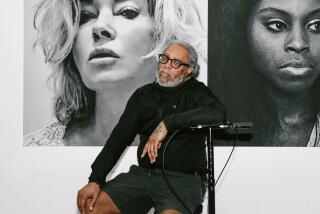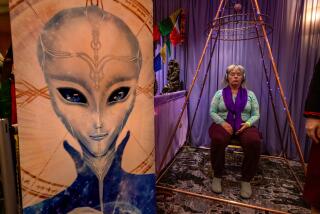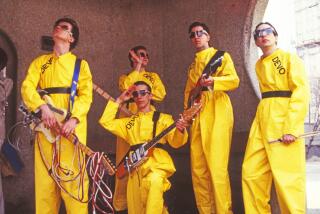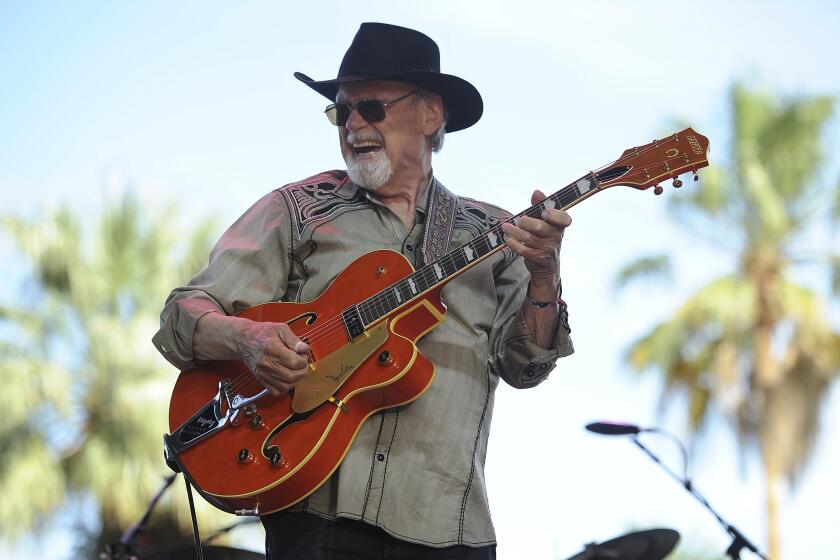Psychic TV and Throbbing Gristle co-founder Genesis Breyer P-Orridge ponders the role of the artist in chaotic times
On Friday the long-running British group Psychic TV will perform its 1982 debut album, “Force the Hand of Chance,” at the Teragram Ballroom as part of the annual Berserktown music festival.
The project of artist, musician and iconoclast Genesis Breyer P-Orridge — who is best known for his work as part of the influential industrial band Throbbing Gristle — Psychic TV has since its inception in the early 1980s issued a curious blend of rock, Brit-pop, psychedelia, acid house and electronic dance music.
As well, P-Orridge has become known for the ways in which s/he has manipulated and used her/his own body to explore ideas of gender, identity and sexuality. The artist, who in writing prefers to be identified with the gender-neutral pronoun “s/he,” has undergone a series of physical transformations to her/his body. In memory of her/his late partner Lady Jaye, P-Orridge uses the plural “we” pronoun instead of “I” or “me.”
The following interview has been edited for length and clarity.
I’m curious about the events that led up to your first Los Angeles performance in 1976. You and your peer in Throbbing Gristle, Cosey Fanni Tutti, did a pretty disgusting performance piece at the Los Angeles Institute of Contemporary Art (now LACMA) involving various bodily fluids and waste.
Genesis Breyer P-Orridge: We started COUM Transmissions in 1969. It sounds awfully weird, but we had a series of visions in a car. We quit university, had gone to London and lived in a very extreme commune called the Exploding Galaxy that was all about breaking down all of the different habitual ways of behaving -- which, strangely enough, is what we’re still trying to do. Break down habits and formulae and try and actually live in the moment.
You couldn’t own anything. You had to justify it. If you wanted money, you had to say why you needed it and what it was for, and that was no other way that you would be able to complete the task, whatever it was, if you didn’t have money.
After that, it was a bit like ‘Animal Farm.’ After eight months, it became obvious that there were double standards. All the people that were sort of the grunts were sleeping in a different place every night, struggling to survive and justify food.
The girlfriend of the person in charge at the time turned up one day and we noticed she had these really beautiful leather shoes on. We said, “Where did [you] get those shoes? Have you always had those?” She went “No, no, I got them this week.”
Even if the world outside is destroying itself ... the job of the artist is to embrace and hold people and say, ‘It’s OK. Be safe here.’
— Genesis P. Orridge
We were all living on rice and whole wheat bread. We of course called them on it, and there wasn’t really a satisfactory answer, so we quit.
We went back up north and dropped off at my parents’ house on the way and they took me for a drive into Wales. We were leaning out the window of the car with my eyes closed and suddenly we started seeing all of these incredible visions -- that actually, with hindsight, were all about quantum physics, particles -- and hearing voices. Later, we realized after meeting [writer and artist] Brion Gysin that we’ve had a flicker experience. The trees triggered the on-off. If you do flicker, you can have psychedelic visions.
What led you to that Los Angeles performance?
As we got more and more recognition, we were actually picked up by the British Council, who are in charge of proselytizing the best aspects of British culture. We actually ended up, by sheer intuitive following our pleasures, as a recognized artistic performance group.
The British council would send us to festivals abroad as representatives of what’s the most unique, new, radical work that’s going on in England. They set up a tour for us in 1976, it was meant to be Canada and the United States. But in October, just a few weeks before we were meant to leave, we did a retrospective at the Institute of Contemporary Art, the ICA.
We named it “Prostitution” because we were saying everybody is selling themselves. Everybody is selling their best skills in order to survive. There is nothing wrong with that. That is just the nature of things.
Just because we used the word prostitution, everybody went crazy. There was a big general scandal in England. There were editorials and the newspapers that said literally things like we should put Genesis P. Orridge in a cage and put him in a dark room and throw away the key. We are reading the newspapers. “Are they talking about me? Saying the entire country should be disgusted by me?” We became what would be called, simply, an enemy of the state.
We became what would be called, simply, an enemy of the state.
— Genesis Breyer P. Orridge
Did that upset you or did you enjoy being put in that position?
It was parallel. This happened to us maybe eight weeks before the Sex Pistols went on TV and freaked everybody out. In fact, we were on the same program as them about eight weeks in advance.
The whole Thatcher, Reaganomics era was hitting. There was this new conservatism — law and order and panic at the disintegration of the old, established values. Sound familiar? Isn’t it ironic? It was almost like now. We were seen as the epitome of everything that was wrong with Great Britain, so much so that a member of Parliament famously said these people are the wreckers of civilization.
It was incredible, but it was scary. We’d be on the subway and look down the carriage and see half the people in there reading the evening newspaper and you’d be on the cover. And it would be saying, ‘Let’s chain them up. This is disgusting. Kill them all.’ No, no, that’s me!
And then, suddenly, after all the scandal, we got this phone call and it was the British Council foreign office. [They said] ‘We are deciding where we’re going to allow you to go.’ We went, ‘What do you mean?” They go, ‘Well, you’re meant to go to Canada and then the United States representing Great Britain. You can’t.
They basically said, “If you go to Canada, they’re not ready for what you’re doing,” To paraphrase, “It would be too disturbing. It would actually shake the foundations of their popular culture and cause far too much trouble.” That’s not how they wanted us to represent Great Britain. They said if you agreed to not go to Canada, we will still allow you to go to United States. If you don’t agree, we will take away your passports and you won’t go anywhere. In the end, we only went to Chicago and Los Angeles.
With similar performances?
Chicago was much more sedate. It was much more as aesthetic and cerebral.

You’ll be performing Psychic TV’s first album, “Force the Hand of Chance,” on Friday, which was released after your aggressive work with Throbbing Gristle laid the foundations for industrial music. What memories do you have about making that record?
In a way, “Force the Hand of Chance” was the first time we were in control of everything that happened to the record. That was the beginning of making music that was what we heard in our head since we were young, early teens.
We’d always heard this music and never been able to actually make it because we did Throbbing Gristle, but that was a different project. This was my vision, a solo vision. I remember very distinctly when we were playing back “Just Drifting,” the first track, crying with laughter. We were thinking, “It’s a love ballad with orchestra, and everybody knows us for this harsh industrial music. What are they going to do when they hear this? The Throbbing Gristle fans are going to be so angry.”
That was a real revelation. It meant, “OK, so doing a ballad with an orchestra can be more radical then grating, hard edged industrial sound.” Because what you’re really doing is breaking expectations. You’re saying to people, “No matter what you expect or think is next, we are going to confound that. When in doubt, do the opposite.”
We wanted to teach people to listen differently. With Thobbing Gristle, that era from ’75 to ’81 was a period when the politics of the time demanded anger and rage. But that can’t last forever. It becomes redundant. You have to at some point go, “What can we do that’s still positive? How can we unify those people who feel disenfranchised, angry and lost? How can we embrace them and make them feel safe?” That was what Psychic TV was always for: To set up a safe place for people. It still is.
As you were talking, I recalled that the first song that I ever heard by Psychic TV was a beautiful song called “Baby’s Gone Away.”
Oh, I love that song!

After I heard it, I went back and started listening more to Throbbing Gristle and I had a hard time bridging that disconnect.
We’ve always loved that song. [Starts singing] “Baby’s gone away/ She’s got nothing to say/ So if you want to hear me crying ...” [Interviewer joins in.] In the end, you can sing things that are really radical -- and you can encourage people to be more positive with the simplest form. In the end it’s all about putting intelligence into it. We always think very carefully about that.
Do you still recognize the younger Genesis who wrote those lyrics?
Well, yeah. Psychic TV has been very consistent and my personal view. There was that strange bit in the middle when we were doing acid house, but in the end it’s about writing poetry that touches people and they recognize themselves within it.
There’s always a new way to do that. There’s always a way to say something that could seem really commonplace and make it special again. That song you mentioned, “Baby’s Gone Away”? We thought, “This is a really simple phrase. That’s just pop music. Can we use that and make it special? Is there a way to put some extra information in there?” We did and it works.
That was one of the times when we realized we were on the right track. That doing something constructive, psychedelic, loving and joyous, celebrating the best things that happened to us day by day, is the right way to go.
And we are still convinced of that, especially right now when the world is regressing into fear, paranoia and anger again. It’s even more important to be positive and generous with the work that you make. We are looking forward to doing it. As Edley the drummer said, “It’s gone full circle.” The first record, “Force the Hand of Chance,” said you do have ways of taking control of the life that you do have and improving it, no matter whether you have resources or not.
And even if the world outside is destroying itself, and fragmented, and paranoid, and fearful, the job of the artist is to embrace and hold people and say, ‘It’s OK, be safe here.’
There’s a lot of terrible music out there. For tips on the stuff that’s not, follow Randall Roberts on Twitter: @liledit
More to Read
The biggest entertainment stories
Get our big stories about Hollywood, film, television, music, arts, culture and more right in your inbox as soon as they publish.
You may occasionally receive promotional content from the Los Angeles Times.






